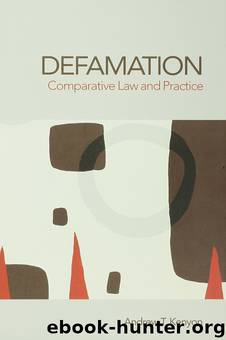Defamation: Comparative Law and Practice by Andrew T. Kenyon

Author:Andrew T. Kenyon
Language: eng
Format: epub
Publisher: UCL Press
5 Litigating Reynolds privilege
Litigating claims of Reynolds privilege may be difficult, particularly in relation to judge and jury roles.101 Defamation law traditionally seeks a relatively simple division of roles under which judges determine whether occasions of publication are privileged, while juries decide if publications were affected by malice. Although there can be complications in judges deciding if a publication’s content is relevant to privileged occasions,102 these complications do not arise as a matter of course, nor do they usually depend on disputed facts. However, the Reynolds factors encompass matters that traditionally are dealt with under malice.103 Many disputed facts could be relevant to the Reynolds factors, with juries needing to determine each of the primary facts before judges decide whether occasions are privileged. (And these jury questions should be framed to seek ‘yes’ or ‘no’ answers.104) Beyond raising issues for pleading,105 this could lead to very complex jury questionnaires as in Loutchansky v Times Newspapers (No 4) where the jury was set an ‘examination paper’.106 Some have suggested this will reduce the jury’s role. Paul Mitchell, for example, has noted,
Now that it is clear that judges can take into account so many factors when deciding if the occasion is privileged, there is a greater chance of privilege being withdrawn from the jury altogether. Where defences of privilege do go before a jury it is unlikely that there will be evidence of malice: if there had been such evidence (for instance, in the tone of the language …), the judge would probably have held that there was no occasion of qualified privilege to start with…. [T]he judge’s decision either way is likely to be decisive.107
Certainly, Reynolds can be seen to blur the distinction between qualified privilege and malice.108 And in Loutchansky, the Court of Appeal said the privilege now attaches to the publication more than to the occasion, which leaves little independent scope for malice.109 But the jury’s role will be increased in another aspect, if it needs to determine the potentially large number of factual matters in dispute under Reynolds privilege. Eady J has commented that in cases in which Reynolds is argued,
It is now almost inevitable that … the jury will be asked to answer a series of questions in order for the court to arrive at the necessary factual substratum upon which to base the ruling. The questions will be directed no doubt largely to establishing the raw data for answering those of the ten non-exhaustive tests identified by Lord Nicholls in Reynolds … as may be relevant to the case in hand.110
Under this approach, judges retain significant powers to interpret and apply those jury answers, with ‘[a]ny value judgments, and to a large extent also any inferences to be drawn from the raw data’ reserved for judges.111
The division of roles could make trial by judge alone more likely. For example, in Gregson v Channel Four Television112 Morland J ruled the jury would deal with meaning, but the rest of the case would be tried by judge alone because of the complex matters relevant to qualified privilege.
Download
This site does not store any files on its server. We only index and link to content provided by other sites. Please contact the content providers to delete copyright contents if any and email us, we'll remove relevant links or contents immediately.
The Brazilian Economy since the Great Financial Crisis of 20072008 by Philip Arestis Carolina Troncoso Baltar & Daniela Magalhães Prates(133836)
International Integration of the Brazilian Economy by Elias C. Grivoyannis(110798)
The Art of Coaching by Elena Aguilar(53202)
Flexible Working by Dale Gemma;(23286)
How to Stop Living Paycheck to Paycheck by Avery Breyer(19720)
The Acquirer's Multiple: How the Billionaire Contrarians of Deep Value Beat the Market by Tobias Carlisle(12317)
Thinking, Fast and Slow by Kahneman Daniel(12267)
The Radium Girls by Kate Moore(12019)
The Art of Thinking Clearly by Rolf Dobelli(10458)
Hit Refresh by Satya Nadella(9126)
The Compound Effect by Darren Hardy(8949)
Tools of Titans by Timothy Ferriss(8369)
Atomic Habits: Tiny Changes, Remarkable Results by James Clear(8327)
Turbulence by E. J. Noyes(8040)
A Court of Wings and Ruin by Sarah J. Maas(7822)
Change Your Questions, Change Your Life by Marilee Adams(7762)
Nudge - Improving Decisions about Health, Wealth, and Happiness by Thaler Sunstein(7694)
How to Be a Bawse: A Guide to Conquering Life by Lilly Singh(7472)
Win Bigly by Scott Adams(7184)
